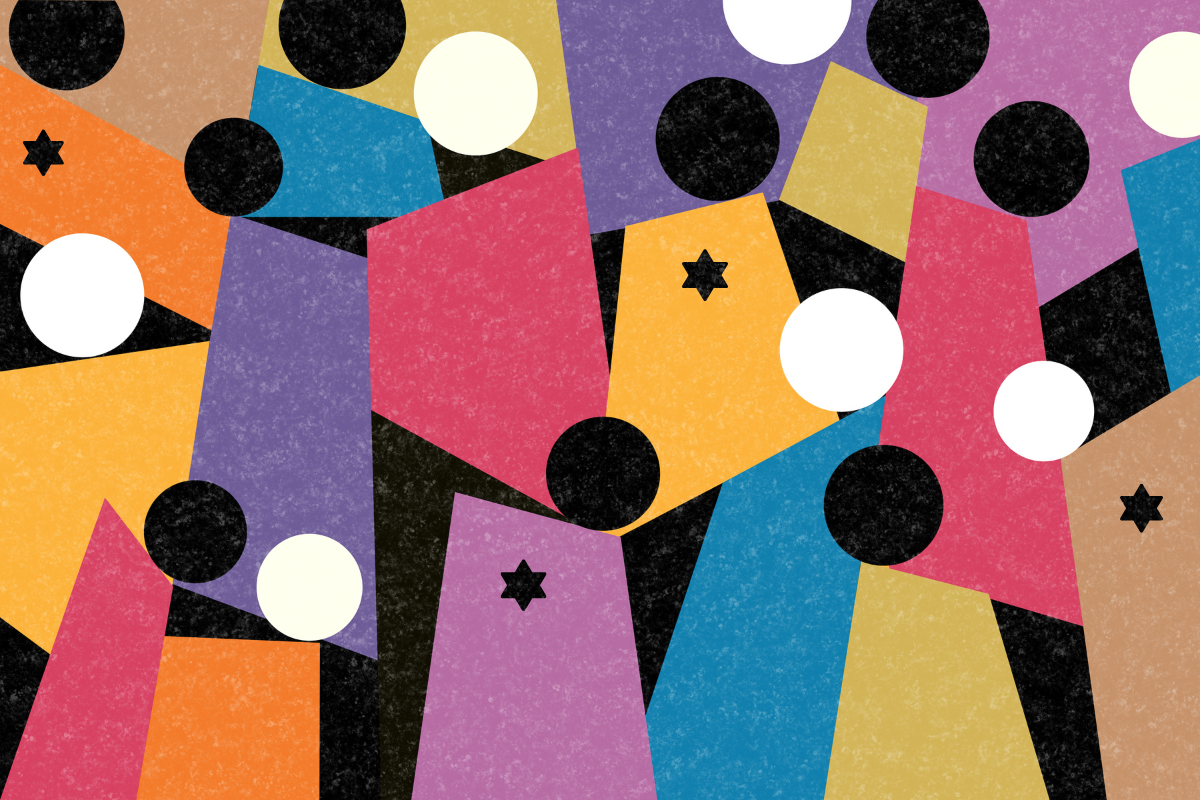I realized I needed to convert to Judaism the same day I realized my child needed early intervention. These were not directly connected, and yet the two journeys became intertwined.
It was Rosh Hashanah, and I’d had to stay home due to work commitments while my partner and our child Birdie visited family out of state. We’d been circling the idea of Judaism for years, coming closer to committing with each loop of conversation and thought. But the pandemic kept us from actively pursuing conversion.
Privately, I was a little glad for this excuse. I wanted to be Jewish, to actively embrace all of Judaism’s values, but I was terrified.
Conversion would require a level of vulnerability that I wasn’t certain I could achieve. Only a few years previously, I’d been pushed out of a faith community for being queer. I was terrified of speaking to the rabbi and being turned away. What if I couldn’t explain why I wanted to be Jewish in a way that made sense?
So we observed holidays at home. We watched services via livestream. We read PJ Library books to Birdie, who at 18 months only spoke three words but listened intently and helped us turn the pages.
As I turned on the Rosh Hashanah livestream, my partner frantically texted me. During their trip, Birdie’s limited access to clear communication had hit a crisis point. Our baby was discouraged, afraid, angry.
“She can’t keep going like this,” my partner said, and I knew it was true.
How awful it must feel to be able to comprehend what everyone around you says but not be able to communicate with them. To move through life with no clear way to be heard.
I was intimately familiar with the misery of being unheard. And my beloved child was hundreds of miles away from me, feeling even more frustrated and unheard.
On the Rosh Hashanah livestream, the rabbi said, “Shana tova.”
It broke me open. I wept alone in my dark living room, wishing it were safe enough to be at the synagogue in person. If only we could be allowed to be part of this. If only I could be certain of a course that would allow my child to not only be loved but understood.
I typed two letters the next day: one to Early Intervention, one to the rabbi at our local synagogue. To Early Intervention, I described one child: a toddler whose catch-all sound was “eh,” who struggled to nod consistently, who screamed with frustration because we heard her but didn’t understand. To the rabbi, I described the same child: my curious, compassionate daughter, my baby who deserved to be raised in a loving community, the number one reason I wanted to convert to Judaism.
At least I could email the rabbi — terrifying, but simple enough. Early Intervention required a fax, which meant going to the library and figuring out how, exactly, a fax machine works.
Almost immediately, Birdie qualified for developmental therapy. Every week, she sat on my lap on our living room floor while her therapist coaxed her into attempting words. She picked up “in,” “more,” “please” and “brr!” — the last of which always included a dramatic shiver. Day by day, she picked up more tools to communicate in a way we understood. She lit up each time she told us something and we listened.
Two months after she started therapy, we met our rabbi for the first time. Birdie didn’t speak, but she didn’t need to. Our rabbi knew the universal language of children: play. He got out a wooden ark puzzle that his own children had once played with, and she sorted the animals at our feet while we talked.
While my partner described knowing they had Jewish ancestry and longing for a tangible connection.
While I haltingly talked about how religion had so deeply misunderstood me before, and how certain I was that Judaism was the right path for my child.
While our rabbi listened.
While he heard us.
Masked and vaccinated, we started to attend Shabbat services in-person. Birdie bounced and swayed to the music while my partner and I sounded out transliterated Hebrew. At home, she got out her toy guitar and strummed on it, then told us “rabbi guitar.”
In December, Birdie said “Hanukkah” (“honk,” but we knew what she meant) and we sure had a happy Honk. By spring, she could say Shabbat and rabbi, though it took her a while to work up the courage to say “Shabbat shalom” to our rabbi. At night, she would say “Shema, Shema, Shema” to herself.
We worked on learning the Shema together one word at a time. I would say “Shema,” and she would repeat it. Then “Yisrael,” which at our conversion became my Hebrew name. For months, we said the Shema like this, slowly, step-by-step, until one night she couldn’t wait for me and barrelled ahead on her own.
Therapists teach you to keep calm when your child says a new word. I praised her and kissed her good night. I waited until I had shut the door to her room to start crying.
Birdie leads me in the Shema every night now.
(In fact, that conversation usually begins, “Mama, Dada, you’re invited to say the Shema with me.” Invited. What a delicious word. What a gift for her to say.)
She runs to hug our rabbi and tell him “Shabbat shalom.” She can carry on an argument with the other kids at our synagogue about who really won at dreidel.
She communicates, and other people understand, and other people listen. Our whole family feels safe in a community where we’ve been loved as we are from the start.
What more could I want for my child?








